Why deuter's Promise Policy is worth a look
Marco, can you tell us a bit about deuter's Promise Policy?
The Policy is based on our sustainability strategy. This strategy was developed in 2020 and consists of six fields of action, divided into the areas of People and Planet for social and environmental responsibility. With this holistic approach, we address our supply chain due diligence, our own business practices, as well as our philanthropic commitments. For each field of action, a risk analysis is conducted, and targets and measures are defined accordingly.
In this regard, the deuter Promise Policy outlines the most important rules and principles that guide us in all our activities and equally apply to our production partners. This includes clearly defined requirements for production partners on Chemical Management, Waste Management, Air Emissions, Climate Change, Biodiversity and Animal Welfare on the environmental side and requirements on Business Practices and Labour Practices on the social side.
The requirements are based on internationally recognized standards, such as the United Nations Universal Declaration of Human Rights, the Responsible Down Standard for animal welfare or the ZDHC RSL and MRSL for chemical management. These requirements partly exceed national laws and regulations because the goal is to perform better than the legally required minimum.
Who is your target group?
The Promise Policy is targeted at deuter’s production partners at Tier 1 and Tier 2 level as well as their supply chains in order to reduce the risk of harmful practices. Its supplementing Guidelines (Planet & People Guideline) are specifically geared towards the suppliers’ needs to better understand and implement the requirements.
Is there any help on how a partner can implement the guidelines?
Its design and the way it is communicated to our production partners is a distinctive feature of our Policy. The deuter Promise Policy is supplemented by two guidelines, the People Guideline, and the Planet Guideline. These Guidelines help suppliers with informative and practical advice to better understand and implement the requirements. They explain the meaning of each social and environmental aspect addressed in the policy and why it is important for the suppliers to consider them. At their core, the guidelines recommend practical actions on how to move towards best practices, and refer to additional helpful tools, trainings, and information. These are linked in the documents and are available free of charge.
How can partners access the guidelines?
We communicate the Promise Policy to our production partners in the form of a Supplier Handbook via an e-learning platform. The Supplier Handbook contains an introduction video, the Policy and its Guidelines, compliance declarations and further related documents. All documents can be viewed and downloaded via this platform, and questions can be directed to the CSR team of deuter. In the future, updates to the Promise Policy and helpful training materials will be communicated via the platform.

Is the Policy only aimed at partners?
The deuter Promise Policy and its Guidelines were published on our website earlier this year. The e-learning platform with the full Supplier Handbook is also freely accessible via the deuter website. Additionally, our production partners are encouraged to pass on the Policy to their upstream supply chain.
What do you hope to achieve with the Promise Policy?
The deuter Promise Policy is also an important step for deuter against the background of legal developments on corporate Due Diligence obligations in supply chains at national and EU level. The CSR department at deuter developed the Promise Policy and Guidelines in consultation with the corporate CSR strategy team. This way, expertise from different departments was included. The idea of the additional guidelines has arisen from personal experiences and exchanges with suppliers on difficulties in handling corporate policies. In the current pilot phase, feedback from suppliers is considered to improve the Supplier Handbook and its documents.
You said that the idea for the additional guidelines came from personal experiences and exchanges with suppliers about difficulties in handling corporate policies. What are these difficulties and how do you address them with the Policy?
A difficulty we wanted to address was to make the Policy not only about compliance, but about cooperation and strengthening the intrinsic motivation of suppliers to address sustainability issues. Planet and People Guideline show production partners how much they can achieve in terms of a safe, fair workplace, the sustainable use of resources, and protection of the (immediate) environment. Thereby, the Guidelines create awareness for their own impact and dependence on these sustainability issues.
The Promise Policy also allows us to engage with our deeper supply chain and serves as a basis to identify where our production partners need targeted support.
What are the next steps?
deuter intents to translate the Promise Policy into Vietnamese and Korean for better understanding and greater impact. It is then to be communicated to all production partners. The Planet and People Guidelines will be updated regularly where relevant as they are generally considered as working documents.
Further on, the means of verifying compliance will be enhanced. Suppliers are required to sign a declaration of compliance with the deuter Promise Policy and the deuter RSL. In the long term, the goal is to verify compliance and progress via certifications and the Higg Index.
How have the partners received the guidelines?
Our partners appreciate the easy handling and follow up on deuter`s requirements via the platform. One feedback from our partners was that the guideline can help understand the direction in which the brand is moving, and it can help track development and help collaborate. In addition, there was feedback that the guidelines would help with their own sustainability work. Overall, this is exactly what we hoped to achieve with the Guidelines. To build trust in our partnership with our production partners and to work together where improvements and support are needed.

Marco Hühn is an engineer for clothing technology and has been working in the textile industry for 15 years, 12 of them in the outdoor industry. At deuter, Hühn is responsible for quality management and sustainability since 2013. Since 2019, he has also been in charge of the repair service at Deuter. He is passionate about sustainability issues and believes it is essential to contribute to a future that is worth living for everyone.
Hühn is keen to improve social and environmental conditions along the supply chain and to advocate for the people working in the sector.

